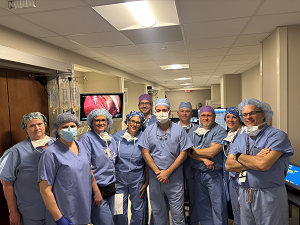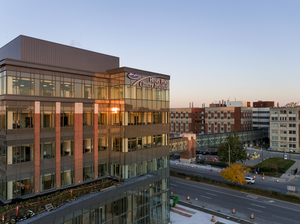Thriving and Surviving- A Blood Cancer Support Group
This monthly virtual support group is open to all Henry Ford patients who have been diagnosed with a blood-related cancer, whether currently in...
The esophagus is the tube that carries food from the throat to the stomach. Esophageal cancer can start anywhere along the esophagus, but it occurs most often in the lower portion.
Esophageal cancer often is not diagnosed until it is in an advanced stage. Our digestive and thoracic cancer specialists combine a team approach with technology to develop a personalized treatment plan that offers the best long-term outcome. We are among only a handful of hospitals in the country that perform robot-assisted esophagectomy, surgery to remove a tumor as well as part of the esophagus. We also have surgeons experienced in colonic interposition (using part of the rectum to reconstruct the esophagus after surgery).
This disease and some treatments can make swallowing difficult or impossible. We offer palliative treatment options to minimize discomfort and improve quality of life.
Anyone can get esophageal cancer, but some risk factors include:
There are two main types of esophageal cancer:
Unfortunately, esophageal cancer symptoms may not be noticeable until the disease is advanced. Symptoms may include:
The doctor may recommend one or more treatments depending on the type of esophageal cancer and your health and personal preferences. Treatment may include:
We participate in a number of clinical trials, which allow patients access to medicines and treatment methods not yet available to the general public. Talk with the doctor about whether you may qualify for a clinical trial.
The most common symptom of advanced esophageal cancer is difficulty or inability to swallow. This is due to the tumor obstructing the esophagus.
We offer a range of palliative treatments to minimize discomfort and make swallowing easier. Some of these options include:
We offer rehabilitation services to help you regain swallowing and eating functions. We also have counselors and support groups available to help you through treatment and recovery.
This monthly virtual support group is open to all Henry Ford patients who have been diagnosed with a blood-related cancer, whether currently in...
Join us each Tuesday for Open Studio, a free-of-charge art therapy group available to cancer patients and survivors where you can spend some...
Join us each Tuesday for Open Studio, a free-of-charge art therapy group available to cancer patients and survivors where you can spend some...
While the use of meditation and breathing exercises are not an alternative treatment or cure for cancer, they have been shown to help people with...




We use cookies to improve your website experience. By using this site, you agree to our Terms of Use. Read our Internet Privacy Statement to learn what information we collect and how we use it.